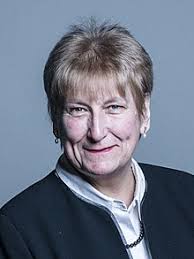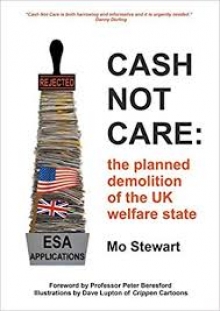Work TV
Watch our TV Channel dedicated to the ‘World of Work’. Explore our video library for informative videos featuring career opportunities at leading companies, franchising opportunities, further education and recruitment professions and their services.
Simon Collyer
Jobcentre Plus Launches Domestic Abuse Support Service
JOBCENTRE PLUS - 'Every jobcentre in the UK will have a trained domestic abuse point of contact by the end of summer,' Work and Pensions Secretary Amber Rudd has announced.
Domestic abuse, or domestic violence, is defined across Government as any incident of controlling, coercive or threatening behaviour, violence or abuse between those aged 16 or over who are or have been intimate partners or family members, regardless of their gender or sexuality.
‘Domestic abuse’ covers a range of types of abuse, including, but not limited to, psychological, physical, sexual, financial or emotional abuse. ‘Domestic abuse’ can be prosecuted under a range of offences and the term is used to describe a range of controlling and coercive behaviours, used by one person to maintain control over another with whom they have, or have had, an intimate or family relationship.
These crimes include domestic abuse, rape, sexual offences, stalking, harassment, so-called ‘honour-based’ violence including forced marriage, female genital mutilation, child abuse, human trafficking focusing on sexual exploitation, prostitution, pornography and obscenity.
If you feel you are a victim of Domestic Abuse ask to speak to an advisor at your local Jobcentre.
You can also call:
24-hour National Domestic Violence
Freephone Helpline:
0808 2000 247
ABC Comment, have your say below:

Union Unite Warn of No Deal Danger as Manufacturing Suffers
UNION UNITE - warns of ‘manufacturing meltdown’ and calls for no deal to be taken off the table amid falling production
Unite, the UK’s largest union representing manufacturing workers, warned of a ‘manufacturing meltdown’ and called for Boris Johnson to take a no deal Brexit off the table.
Responding to today’s (Thursday 1 August) latest PMI manufacturing survey which showed UK factory output ‘suffocating’ amid the biggest production cut by manufacturers in seven years, Unite assistant general secretary for manufacturing Steve Turner said: “We are on the precipice of a manufacturing meltdown turbo charged by Brexit uncertainty and the threat of a job destroying no deal Brexit.
“Today I’m in Northern Ireland where the future of Harland and Wolff is hanging by a thread, for sale signs hang over Bombardier and the future of Wright Bus remains uncertain. These are three manufacturing giants supporting thousands of jobs, families and communities.
“Elsewhere, uncertainty over the jobs of thousands of skilled well paid manufacturing jobs hang in the balance, from Vauxhall’s Ellesmere Port plant to British Steel. It’s time Boris Johnson woke up to the reality of the manufacturing emergency facing communities across the UK.
“These are jobs and communities that matter to the country’s future prosperity and the prospects of generations to come. Burning through millions of pounds on a no deal PR blitz will not secure UK manufacturing or the jobs it sustains. Boris Johnson and his team need to tell the UK’s talented manufacturing workers directly that they will not betray them or their families by condemning them to the dole queue.
“We urge Boris Johnson and his government to think very hard about the consequences of their actions. They must take no deal off the table and sit down with Unite and our manufacturing industry to hammer out a long-term plan for manufacturing that invests in jobs, communities and innovation to ensure the UK continues to be the global leader it is.”
ABC Comment: We are worried about the effect on jobs of a No-deal Brexit. There could be a shortage of fresh food and prices will rise. Food Bank use could explode.

It Is The Silly Season - The School Holidays Are Here
HOLLIDAY HUNGER - has been in the news, but aside that rather serious issue, the sun is shining, and it is time for the kids to enjoy a well-earned break.
We met these two fine 'chaps' in Colchester Lions Walk Shopping Centre yesterday (see below). There are all kinds of ways of making a living - being the back end of an Ostrich on your CV would certainly get you noticed.
On a more serious note: Ostrich farming was tried in the UK. Ostriches are extremely skittish in their first three months and are prone to running into fences and killing themselves following being ‘spooked’ by a clap of thunder or other such happening. As such there are breeders that specialise in ‘early years’ farming before passing on the more developed birds to other farmers.
The mating season begins in March or April and ends sometime before September and special mating farms keep breeding pairs. In cold weather Ostrich’s cover, their legs with their wings to keep warm. The birds can run for a long time at a speed of 55 km/h (34 mph) or even up to about 70 km/h (43 mph), the fastest land speed of any bird. The eggs are highly decorated in South Africa and sold as ornaments in the tourist industry.
Ostriches are farmed for their meat, their skin for leather and the feathers are a fashion accessory and used for feather dusters. Anyone who has seen the TV series: Peaky Blinders will know how fashionable feathers were in ladies’ hats in the eighteenth century. The hats used long hat pins to stay in place, but the pins were so dangerous that one MP tried to have them outlawed in parliament.
These guys love their work and the kids and adults were having great fun interacting with them.
ABC Comment, have your say below:

Jobless Up in Israel
The seasonally adjusted unemployment rate in Israel increased to 4.1 percent in June of 2019 from an upwardly revised 3.7 percent in the previous month.
It was the highest jobless rate since February, as the number of unemployed rose by 19.9 thousand to 169.5 thousand and employment declined by 10.8 thousand to 3,949.2 thousand.
Unemployment Rate in Israel averaged 6.72 percent from 1992 until 2019, reaching an all time high of 11.40 percent in March of 1992 and a record low of 3.60 percent in January of 2018.
ABC Comment, have your say below:

Half of Britains Live in Debt
Almost half of UK adults are currently in debt and believe the rising cost of independent living is to blame.
A survey of 1,000 UK adults published in The UK Spending Report, commissioned by a leading personal insolvency practice, Creditfix.co.uk, has revealed that almost 1 in 2 Brits (46%) are currently in debt.
Those who admitted to being in financial difficulty were found to have an average debt of £6,465.
The top cause of debt in the UK has been revealed as increases in household bills (36%) followed by raised rent or mortgage repayments (33%).
- Almost half of British adults are in currently in debt
- 46% of the population are living with an average of £6,465 in debt
- The rising cost of owning and running a home listed as the top causes of debt
Experts suggest these increases in housing costs are the result of a growing demand for new property, of which there is a dwindling supply. The Royal Institution of Chartered Surveyors predicts the housing crisis will prompt a 15% surge in housing prices over the next five years.
Brits also listed credit card interest as the third major cause of debt (21%). Fourth on the list was excessive spending on clothes and accessories (19%) and general overspending (16%) completed the top five causes.
Taylor Flynn, Head of Marketing at Creditfix, comments: “The average British adult owns three credit cards with a total credit limit of approximately £10,000 available to them across these. With so much credit on hand, it's easy to understand how temptation can get the better of people sometimes - but treating ourselves on credit can be a slippery slope.
“The property market is booming at the moment and the costs associated with being a homeowner are continuing to rise, so it’s unsurprising that many people are struggling to keep on top of these costs.
“Credit repayments, excessive spending on clothes and accessories, and general overspending however is a different ballgame. We classify these as non-essential expenses and so it seems that there is some work to be done to educate Brits. Everyone deserves a treat from time to time, but there are ways that people can treat themselves whilst still being savvy with their finances.”
ABC Comments, have your say below:

Self Employed Week Ireland July 29 to August 4
Self Employed Week, Ireland runs from July 29 to August 4.
There has been a lot of critisizm in the past by the self-employed of high taxes but with little for them in return.
Here is what Fine Gael is doing to help those wanting to get into self-employment.
Extension of the Treatment Benefit Scheme.
In March 2017 the Treatment Benefit scheme was extended to some 450,000 self-employed people and their dependent spouses for the first time.
This included small business owners, farmers, tradespeople, freelancers, contractors and professionals.
It meant that people who work for themselves and pay PRSI at class S - now get the same regular dental and optical examinations, free of charge, that previously were only available to employees.
Extension of Invalidity Pension to Self-Employed Persons.
Entitlement to Invalidity Pension was extended to the self-employed from December 2017.
For the first time, this gave the self-employed access to the safety-net of income supports if they become permanently incapable of work as a result of illness or disability, without having to go through a means test.
Extension of Jobseeker’s Benefit for the Self-Employed
From November 2019 Jobseeker’s Benefit will be extended to the Self-Employed.
It will provide a social insurance support to self-employed contributors who lose their businesses and, hopefully, provide them with the breathing space and support they need as they re-assess their next steps.
Earned Income Tax Credit
The equalisation of the Earned Income Tax Credit with the PAYE Tax Credit is also part of Fine Gael’s self-employed agenda.
We have made progress in recent years, for example, for 2019 you may claim an Earned Income Tax Credit of €1,350, increased from €950 in 2017 and €1,150 in 2018.
ABC Comment, have your say below:

Unite Holiday Hunger Protest Outside DWP HQ
With the loss of free school meals given out during term time, in addition to the extra childcare costs around the holidays, families already struggling with low budgets find it difficult to feed their children. Three million children in the UK are at risk of going hungry during the school holidays.
Unite are holding a protest outside DWP HQ Caxton House, Tothill Street, London SW1H 9NA (main London event) Time: 13.00-15.00
Bring empty lunch boxes, homemade placards and paper plates with messages on them and banners too. Organised by: Unite Community FB event.
The event is on Facebook: https://www.facebook.com/events/1368005423355842/?ti=icl
ABC Comment, have you say below:

‘Cash Not Care': The Planned Demolition of The UK Welfare State
Following Simon Collyer appearance on RT TV, Simon was recently contacted by campaigner and author, Mo Stewart.
Mo is an Independent Disability Studies Researcher and the author of Author of, ‘Cash Not Care': the planned demolition of the UK welfare state’ - New Generation Publishing 2016.
Allegedly described as 'difficult' by the Cabinet Office, Mo certainly does not mince her words: 'The situation is getting worse Simon, that’s why people are dying in their thousands as the DWP disregard diagnosis and force people to look for work'.
We have been sent these links by Mo which may interest people who want to understand more about what is happening to disabled people and to the United Kingdom welfare state. Understanding the great threat we all face from the Americanization of our welfare system.
See: Psychological tyranny prescribed by the DWP: preventable harm is government policy
British Journal of General Practice, Dec 2018
https://bjgp.org/content/68/677/579
The American corporate influence with British welfare reforms
Text of a talk given in L’pool as part of the Welfare Imaginaries Conference, Sept 2018
https://www.centreforwelfarereform.org/library/us-influence-on-british-welfare-reforms.html
Mo in her words:
If ten years of research has taught me anything it’s that research is limited by the evidence it contains, by the motivation and honesty of the author(s) and, to a large extent, by who funded it as cash is usually at the heart of any government deception. My book ‘Cash Not Care’ was the result of seven years of in depth personal research which collated evidence from the academic world, the disabled community and from the distinguished professional evidence that is never identified by the national press so the British public remain in ignorance of the preventable harm created by the British government; supposedly on their behalf and in their name. Information is scattered everywhere and only luck, and the persistence of this researcher, will bring significant evidence all together in one place. Here I offer a selection of evidence from distinguished professionals. The page begins with contributions from disabled people themselves who are working voluntarily but who, due to their significant skills, provide very detailed high calibre professional reports. Expect to learn a lot. MS
https://www.mostewartresearch.co.uk
https://www.researchgate.net/profile/Mo_Stewart/publications
ABC Note: Mo, is a fantastic campaigner for the disabled. The research and detail in her book is amazing. If we can help raise her profile and encourage people to read her book, then we have achieved something really worthwhile.
Mo Stewart is a former healthcare professional, originally trained in the NHS. She served in the Women’s Royal Air Force (medical branch) until her medical discharge in 1984, due to the onset of a permanent illness, for which she was awarded a War Pension for life. Since December 2008, when a staff member from Atos Healthcare conducted the fatally flawed Work Capability Assessment instead of a War Pension review, Mo has been conducting self-financed independent research.
Not Care: the planned demolition of the UK welfare state’ was published in September 2016.

The House of Lords Have Been Debating Universal Credit: Managed Migration
The Parliamentary Under-Secretary of State, Department for Work and Pensions (Baroness Buscombe) (Con) has been answering questions on managed Migration to Universal Credit.
If you are being migrated to UC, this debate may be of interest to you.

Image: Rt. Hon Baroness Buscombe
My Lords, with the leave of the House, I shall now repeat a Statement made in another place by my right honourable friend the Secretary of State for Work and Pensions. The Statement is as follows:
“Mr Speaker, at the core of this department is the desire to deliver a considered and considerate welfare system that incentivises work. Universal credit has been rolled out nationally and now has over 2 million claimants. We continue to listen to claimants, stakeholders and Members of this House to improve the system. In short, we examine what works and act accordingly. That is why one of my first acts as Secretary of State was to announce legislation for a small pilot to move existing welfare claimants on to universal credit. This managed migration involves moving claimants who are still on legacy benefits and have not had a change in circumstances across to universal credit. This pilot will give colleagues and claimants confidence in the department’s approach to the transition before we return to the House to report on progress and seek permission to extend managed migration.
Today I am laying regulations to commence the pilot for no more than 10,000 claimants, which will start this month as promised. We will begin with one site— Harrogate, as previously announced—to ensure that people’s transition is carefully supported. We have the possibility to extend the pilot to further sites as it progresses. This will allow us to learn from putting processes into practice, and to adapt our approach accordingly. The department will continue to work closely with expert stakeholders to ensure that the pilot supports the most vulnerable and hard-to-reach claimants. Claimants who are moved to universal credit will be eligible for transitional financial protection to safeguard their legacy entitlement. They will also have access to additional financial support before they receive their first UC payment, including the two-week run-on of housing benefit and the discretionary hardship payment, in addition to advances.
I want to reiterate that the department does not intend to stop the benefits of anyone participating in this pilot. Instead, we will be testing how we can encourage and support those moving over to universal credit, without halting their benefits. The listen-and-adapt, evidence-based approach is the right way to deliver universal credit.
We have also revised our approach to claimants who are entitled to the severe disability premium. The regulations that I am laying today will enable us to begin to provide support for claimants who were entitled to the premium and have already moved to universal credit. From 24 July 2019, these claimants will be considered for backdated payments covering the time since they moved to universal credit. These claimants will also gain access to ongoing transitional payments that reflect the severe disability premium to which they were previously entitled. We have reviewed the rates of those payments to enable the most vulnerable to receive increased support. Claimants will now receive payments of up to £405 per month alongside their universal credit award, increased from the previous proposed maximum of £360. We estimate that by 2024-25, approximately 45,000 of the most vulnerable claimants will benefit from this package of support, worth an estimated £600 million over the next six years. My department will begin the process from Wednesday 24 July 2019, ensuring that claimants are paid at the earliest opportunity.
Following the High Court judgment on the severe disability premium, these regulations will also bring to an end, in 2021, the barrier that currently prevents its recipients moving to universal credit through a change of circumstances. Until 2021, anyone currently receiving SDP whose circumstances change will continue to be held on legacy benefits, as they are now. After 2021, the barrier will be removed. SDP claimants will move on to universal credit through natural migration, gaining access to the new payments available to those who have already moved over.
The department will continue to follow this approach in the weeks and months to come, identifying areas for improvement and seeking new ways to better support claimants. In the months ahead, we are completing an evaluation of the effectiveness of universal credit sanctions in supporting people into work in order to report back to the Select Committee in the autumn; evaluating the results of our pilots that explored offering claimants more frequent benefit payments on demand; launching a new service for private sector landlords to receive housing benefit rent payments directly from the department; and continuing a proof of concept in south London to test a “written warning” sanctions model whereby a sanction is not applied on the first failure to attend an appointment.
I am determined—and I know the department is determined—to ensure that universal credit is always a force for good”.
3.39 pm
Baroness Sherlock (Lab)

Image: Baroness Sherlock (Lab)
My Lords, I thank the Minister for repeating that Statement. We have had a lot of Statements from DWP in the last year, and there is beginning to be a rule of thumb that the gentler and blander they sound at the time, the more they contrast with the story behind them. I will try to unpack what I think has happened to get us to this point, and I invite the Minister to correct me when she responds if I make any mistakes.
I think this is now the fourth version of these regulations, and the plot has thickened with every turn. We have been awaiting a debate on them for months and suddenly, in the very last days of this Session, they have been snatched away and replaced with a negative version. These regs cover two things: the process of moving people en masse on to universal credit—known as managed migration—and the losses faced by people getting the severe disability premium in legacy benefits, who lose out a lot when they go on to universal credit because there is no equivalent in UC.
The Government originally published some draft regs in June last year. These prompted outrage because the process of managed migration turned out not to be managed at all, but meant that millions of people would simply get a letter saying, “Your benefits will stop on date X. It is up to you to apply for universal credit. If you do not apply for that date then you will not get any money, and if you do not apply within a month, even if you get money later, you will lose the right to make sure that you get transitional protection, which stops you being worse off”. That went down very badly. The Government had intended always to pilot these, but the regulations covered managed migration as a whole.
The same month, Esther McVey, then Secretary of State, had announced that nobody else who was getting the severe disability premium would be forced on to universal credit until the managed migration stopped, so they could not lose out on that transitional protection, and that the Government would compensate people who had already gone across for the money they had lost. That statement, as it happened, coincided with a successful legal challenge against the Government by two people who had moved house, had to go on to universal credit and lost out as a result. The Government were then required to pay them damages and ongoing payments of nearly £180 a month. I wonder whether the Government are still appealing the various decisions on this.
The Social Security Advisory Committee then consulted on the regulations, and eventually some slightly revised regulations were tabled on 3 November together with a very critical report by that committee. That version of the regs still covered the whole managed migration process, involving up to 3 million people, even though everybody had urged the Government to take powers only for the pilot and then to come back to Parliament. There was also strong criticism of this approach from voluntary organisations working with claimants, because they were worried that many vulnerable people getting benefits would struggle simply to take responsibility for making the transition to the new system alone. The SSAC report also flagged up that the payments being made to people who had been moved across under UC and had lost this disability benefit were actually only £80 a month, whereas their losses were £180 a month.
Then, Amber Rudd became Secretary of State. She admitted to the Work and Pensions Select Committee that the Government had thus far failed to obtain cross-party support for these regulations. In January, they withdrew the SI laid in November and brought in two new SIs: a negative one, which prevented anyone else getting this disability payment from transferring to UC before managed migration, which came into force in January; and an affirmative SI which was to provide for a year-long pilot for managed migration and set the level of transitional payments for those who had been moved on to UC loss of disability payment. With me so far? Excellent.
We have been waiting since then to debate this affirmative SI. The Secretary of State said in March that the pilot would begin in July, and said again on 1 July that the pilot would definitely begin this month, yet there was no debate on the regulations which would provide for the pilot to take place. That is possibly because the regulations contained provisions for payments to people on this disability benefit which have been found to be unlawful. However, Ministers had promised that the pilot would not start without Parliament having had a debate first. In fact, on 8 January, the Minister for Employment, Alok Sharma, told the House of Commons:
“We will also ensure that the start date for the July 2019 test phase involving 10,000 people is voted on”.—[Official Report, Commons, 8/1/19; col. 175.]
Well, it has not been.
There were serious questions about the pilot. Ministers needed to be clear about the aims and the success criteria and whether or not the nature of the pilot would satisfy people. Those were the questions that Parliament wanted to debate before the regulations were approved. Then, the final twist: yesterday those regulations were withdrawn and a new negative regulation was tabled instead, published in the last week of term to take effect in the same week. The Government are not even abiding by the convention that 21 days should elapse between tabling regulations and their taking effect. Moreover, although it is a wonderful thing that the eyes of the country are on the Palace of Westminster this week, they may not be looking at us primarily for the purpose of considering universal credit and the managed migration pilot regulations.
I am really worried about universal credit and how it is rolling out. The Government should stop rolling it out while they fix it. But that is for another day. These regulations affect two specific but important issues and Parliament has a right to consider them properly. There may be an urgency but it is entirely of the Government’s making; handling it in this way is disrespectful to Parliament.
I ask the Minister three questions. First, can she explain why, having promised that Parliament would debate the regulations before starting the pilot, Ministers have reneged on that commitment? It cannot surely be simply because Amber Rudd admitted that she did not know that she could get them passed in the other place. We surely cannot have come to the point where Parliament will no longer be asked questions unless Ministers are satisfied that the answers will be the ones they want.
Secondly, can she guarantee that everybody who was getting STP and has been moved across to universal credit will be no worse off than they would have been, and that the Government’s new plans satisfy the requirements of all the legal judgments against them?
Finally, will she promise that Ministers will return to Parliament with a full report of the results of the pilot and give us the chance to debate them before laying any further regulations for a full rollout of managed migration?
I do not blame this Minister, but it is the responsibility of her department. I urge her to answer those questions as fully as she can in order to start trying to rebuild some trust.
Baroness Janke (LD)
My Lords, I too am grateful to the Minister for repeating the Answer to the Urgent Question and would like to ask some questions about the pilot.
I am not completely familiar with processes of this kind and am grateful to the noble Baroness for raising a lot of issues that had occurred to me. I would be grateful if we could have more detail of the scope, approach and methodology of the pilot, when the findings are likely to be made public, when there will be an opportunity for external agencies to examine and question the report and, indeed, when there will be a debate here before the Minister comes back to Parliament for permission to carry out managed migration.
I hope that the pilot will look at some of the needs as expressed by the various groups and that they will be taken account of and reviewed: for example, bringing assessments back in-house for people with disabilities, following the whole record of the assessment process; providing split payments to protect vulnerable women; reviewing the work search process requirements, particularly for women with young children or caring responsibilities; and the piloting of different approaches to digital accessibility, particularly for disadvantaged groups and people with disabilities.
I welcome the proposed action on the judgment of the High Court and would like more detail as to how it will communicate to all people who are eligible, with a report back from the Minister on how that is being carried out. I very much hope that the pilot will provide us not only with insight and the chance to review some of the problems that I have been aware of since I have been covering the issue, but the opportunity for debate and external scrutiny before the managed migration process is carried out in full.
Baroness Buscombe
I thank both the noble Baronesses, Lady Sherlock and Lady Janke, for their questions. I have to agree with the noble Baroness, Lady Sherlock, that it has been a journey. It has not been easy, but I am pleased to say that we are, we believe, now in a very good place. It has taken longer than we would have liked, but through that process, we have made some serious improvements not only to the whole system of universal credit, as people naturally migrate—we have now had the rollout into all job centres as of the end of last year—but to thinking through what we should do on managed migration. Indeed, I remind noble Lords—I am looking at the noble Baroness, Lady Donaghy, who is part of the House of Lords Secondary Legislation Scrutiny Committee—that that committee suggested that the department should legislate for a pilot phase. I remember that the suggestion was first made at a meeting of all Peers. I cannot remember the date—I apologise—but it was some time ago. We listened to that recommendation and suggestion and, as many noble Lords will know, are now and have been for some months working closely with key stakeholders. We invited more than 80 to talk to us about how they might like to be involved to help us. Noble Lords will agree that this is a huge enterprise, a huge reform that we are working through, and we need their support and understanding. We need to learn from and work with them and test our processes. Much of this—I turn to the noble Baroness, Lady Janke—is about ensuring that we get it right by introducing a pilot, which we will keep to no more than 10,000 people, before we move on to the fuller phase.
I will answer some of the key questions. Why has it taken so long to lay new regulations? Our previous draft regulations were subject to a judicial review. That judgment quashed parts of Schedule 2 but made it clear that it was up to the Secretary of State to decide how to respond. We have been considering options and are now in a position to re-lay the regulations.
Why did we change from an affirmative—where we thought we were in the right place to debate with noble Lords—to a negative procedure? The previous draft regulations included an appeal rights provision, which clarified that there were no appeal rights for procedural matters where claimants are issued migration notices, request an extension of the time to claim or request a cancellation of migration notice. These revised regulations now introduce only a pilot, rather than managed migration as a whole, and a provision has been removed, making them now subject to the negative procedure. However, I make it clear that the provision was a clarification of policy, so its removal does not represent a policy change. In relation to appeals, claimants will of course be able to appeal their universal credit benefit decision if they feel that it is incorrect.
It is important to say that because only pilot regulations are being introduced, the department must return to Parliament for approval to continue managed migration activity after the pilot has been evaluated. We will bring forward such legislation only when the process works in the best possible way for everyone. While I appreciate that this means there is no automatic debate and vote on these regulations, Parliament will still have the opportunity to consider them.
We have broken the 21-day rule, as alluded to by the noble Baroness. It is there to allow people to prepare for the changes that legislation will introduce, but claimants have been expecting these changes in this legislation for over a year and they are positive changes. Therefore, after careful deliberation—and particularly considering the delay engendered by the judicial review and responding to the judgment—we have decided that our primary concern should be to pay former severe disability premium claimants the transitional payment as quickly as possible. Bringing into force the managed migration provisions will allow DWP to issue a migration notice—then claimants will have three months to claim.
We were asked why we are not laying the SDP transitional payments separately. SDP transitional payments are a fundamental part of the wider transitional protection framework. As the transitional payments are inextricably linked with the wider rules for transitional protection, it is essential that provisions for former SDP claimants form part of the regulations that introduce transitional protection as part of managed migration.
I say to the noble Baroness, Lady Sherlock, that the Government are still appealing the TP and AR judicial review.
For those noble Lords who are not familiar with it, I will now give more detail about the managed migration pilot. We have chosen to commence the pilot at one jobcentre—Harrogate—where we will seek to learn from many cases with complex needs. It has a case load with a mixture of urban and rural claimants, which will further aid our learning, and is supported by a local service centre under the same management. It is important that we test an approach that is based on using existing relationships that the DWP or trusted partners, our stakeholders, have with claimants. Through these relationships we will establish whether someone is ready to move and how to get them ready.
We will initially select claimants for the pilot from those who currently attend the jobcentre for meetings with their work coaches. The work coaches will then build on these existing relationships to prepare claimants to move and support them through the process. We will start with small numbers and grow the pilot safely, only increasing it when we feel it is right to do so. We have thought through the process. We have been working closely and continually with stakeholders to make sure that we work with the evidence and that we make necessary changes as we develop the process.
It is also important to make it clear that there will be a considerable number of gainers in this process. Some £2.4 billion-worth of unclaimed benefits is not going to the people who need them because they do not know about them. By supporting claimants who may have been on universal credit for many years, without any change of circumstance, and who have not been in touch to re-engage with us, universal credit will make sure that this money will reach those who need it most. There are some amazing stories of where this has happened to date. When migration is complete, because of UC, 700,000 more people will be paid their full entitlement, worth an average of £285 a month.
More disabled people will receive higher payments under UC. The rate in UC for these claimants is higher at £336 per month—up from £169 per month on the equivalent ESA support group. This means that around 1 million disabled households will gain on average around £100 a month on universal credit.
It is a continuing journey but we are in a good place to do the right thing by going forward in a measured way, working with claimants—particularly vulnerable claimants— and making sure that we look after those who need our support.
Baroness Janke
Did the Minister say there would be a report on the pilot? I specifically asked whether there would be a report which could be scrutinised and, if necessary, debated.
Baroness Buscombe
I am glad that the noble Baroness has prompted me. We will publish an assessment of the impacts prior to scaling of managed migration. As we said in our response to SSAC, we are conducting detailed equality assessments of migration plans as part of our public sector equality duty. We will report on the impacts of the testing, which will be evaluated, and we will respond through a report on the learning and adaptations.
3.58 pm
Lord Kirkhope of Harrogate (Con)

Image: Lord Kirkhope of Harrogate (Con)
My Lords, perhaps I may comment, as the Baron of Harrogate and a resident of Harrogate, that I will be watching the pilot with great interest. I hope that the positive outcomes my noble friend is anticipating will be delivered for the people of Harrogate.
Baroness Buscombe
I thank my noble friend for his question. As he will know, Harrogate has a strong mix of benefit claimants that will reflect case loads across the country as we start to scale. We looked at this issue carefully and took some time to choose somewhere that would have a strong mix of people who can work with ease with us and others who have differing complex needs. We wanted to be sure that we could reflect case loads across the country as we start to scale. There are many cases with complex needs which we will be seeking to learn from. Harrogate also has a case load with a mixture of urban and rural claimants, which makes a difference in terms of people’s approach. This will further aid our learning and is supported by a local service centre under the same management as the jobcentre. So I hope my noble friend will stay in touch with developments in Harrogate. We are very keen to start work tomorrow if all goes well.
Baroness Lister of Burtersett (Lab)
My Lords, I think that my noble friend asked for Parliament to be able to debate the report on the pilot before the regulations are laid, because it is very disappointing that, although the Secretary of State said that the Government continued to listen to Members of this House to optimise the system, they do not seem terribly interested in what we might have had to say about the pilot. I think that we could have come up with some constructive thoughts on that pilot, so that is disappointing.
I welcome the fact no one will lose their legacy benefits if they do not move on to universal credit during the pilot and what the Secretary of State called the “who knows you” approach, but how far will it be possible to learn lessons about the potential dangers of the widely criticised hard stop that my noble friend referred to once managed migration is fully rolled out? Because then, of course, that will no longer apply; people will lose their legacy benefits. And how easy will it be to scale up this approach nationally when the local support networks that the Government are very much relying on here are so variable and, in some places, pretty thin and probably getting thinner with local authority cuts? Also, the staff to claimant ratio is likely to be rather worse than it is for the pilot. So, just how much can we learn from this pilot in terms of what the fully scaled managed migration will look like?
Baroness Buscombe
I will respond to the noble Baroness by saying that I absolutely appreciate and very much respect the work that she does in relation to supporting just the sort of people we want to support through this process. I am quite surprised in some ways that the noble Baroness is not more involved with the stakeholders who we are constantly now engaging with—but I am sure that she is aware of those who are working with us in number to guide us and test us to make sure that we do not pursue a route that looks as if it is not going to work. We have to do this in a way that takes account of all the differing complex needs that people have, which is not going to be easy. People sometimes fluctuate over time in terms of those needs, so we have to be very, very flexible, and we think that that is the best way of working on this. Again, I go back to the advice from the Lords committee that suggested that we have a pilot just to make sure that we do our utmost to ensure that nobody falls through the cracks.
The noble Baroness referenced the hard stop. Once issued with a migration notice, claimants will have at least three months to claim universal credit and we are piloting this approach precisely to learn how we can contact and support people to move to universal credit without ending their legacy entitlement. We are not intending to move people to UC by stopping their benefits in the pilot. We will be testing how to encourage and support people moving on to universal credit without needing to stop benefits. It is not a question of hard stop and just giving people notice and then saying, “Sorry, cheerio, you haven’t responded”. We will do what it takes. There would have to be highly exceptional circumstances, I suggest, for there to be a situation where we had failed through every avenue to be in touch with someone and so would end their benefit. I have to say that it has not been and is not our intention to allow anyone to have their benefits stopped. The phrase “hard stop” evolved from the Opposition Benches, I think, and it is something that we have worked hard to deflect, because we do not want people to fall through the cracks or to stop receiving benefits because we have failed in some way to ensure, by visiting their homes, making contact with them, working with them and encouraging third-party trusted support to work with them and us, that we do the right thing and look after these people who need our ongoing support.
The Lord Bishop of Durham
My Lords, I thank the Minister for all she said and look back several months to how she involved us and engaged with a group of us in a range of helpful ways. The regulations that have been laid show evidence of the Government having listened. I am deeply grateful for the ongoing engagement with stakeholder groups. However, along with my noble friends who have already spoken, I wish to highlight that this House and the other place, not the stakeholder groups, have to scrutinise the regulations, so to land them on us at this point in a negative form seems quite hard to take, if I am being honest.
I thank the Minister for the explanation about Harrogate—I had written down, “Why Harrogate?”—but Harrogate is not going to produce 10,000, so presumably work has been done on other places that would also offer that kind of thing. Can the Minister give us any indication of where after Harrogate, because there will be similar issues?
I have three further questions. The Statement began by emphasising yet again that UC is about helping people into work, yet we know that the largest percentage of people are already in work. So, in the pilot, what examination will be undertaken to see whether UC really is helping people into work? Secondly, will the pilot include people who are being negatively impacted by the two-child limit, and will an analysis of the impact on those affected by the two-child limit be undertaken as part of the pilot? It could offer some comparison with the report All Kids Count, which sought to offer some analysis which shows how severely damaging the two-child limit is proving to be.
Finally, on migration notices, paragraph 44 of the regulations is very clear about people being informed that,
“all awards of any existing benefits to which they are entitled are to terminate and that they will need to make a claim for universal credit; and … specifying a day (‘the deadline day’)”.
Will the Minister acknowledge that this phrasing will still be extremely hard for people to hear and receive when a letter arrives stating that all their benefits are going to be terminated and that they will have to make a fresh claim? I acknowledge that the earlier criticisms about timescales have been heeded and there is a three-month wait, but what thought has been given to how that kind of letter will be worded to make it very clear that, as the Minister has said to us, it is not the intention that benefits will be terminated in the sense that no benefits will be received? That is not how it sounds in the regulations.
Baroness Buscombe
I thank the right reverend Prelate for his positive response to these regulations. I appreciate the frustration of noble Lords who feel that they seem to have come late in the day. As I said, the key reason for that relates to the judgment, which we needed to respond to. We needed to get it right. The judgment said that there was an unintended consequence and we were not being quite fair in how we were treating people in terms of the severe disability premium. We are really keen to get that right. From tomorrow, we can start working on how we can support those people, backdating their pay and so on to ensure that they are properly supported financially.
I want to be very positive about universal credit and about how the pilot will help more people into work. It is really important to stress that managed migration will open up the world of work for thousands and deliver financial support for those whose circumstances have not changed. The good news stories that our department reads about, listens to and sees on our videos and on social media on a daily basis are very different from some of the scaremongering that has gone on over the many months and years during which universal credit has been developed. It is fantastic when one meets people who feel for the first time an extraordinary sense of dignity and pride, and a sense of “can do”—a phrase used by the person who will become our Prime Minister tomorrow. That is really important, because these are people whose families, sometimes over generations, have not worked. They have lived in families who do not understand what the word “work” means and they have had no sense of self-worth. Now, they have that and it is fabulous. Therefore, I hope that the right reverend Prelate will support—
Lord McKenzie of Luton (Lab)

Image: Lord McKenzie of Luton (Lab)
My Lords—
Baroness Buscombe
I am in full flight here.
Lord McKenzie of Luton
Does the Minister accept that this Government were not the first to understand the importance of getting people into work? If she goes back just a few years in history to previous Governments, she will see that it was a Labour Government who started the process of engagement with people, rather than leaving them to rot on disability benefits. The game plan of the noble Baroness’s Government was to push people on to disability benefits so they would not count as part of the unemployment statistics. It was only when a Labour Government came in that programmes such as New Deal and many others were started.
Baroness Buscombe
One reason I became a Conservative was that there was an incredible advertisement in 1979 that said, “Labour Isn’t Working”. It showed lines and lines of people outside what we then called the employment exchange. That was a long time ago, but in 2010—the noble Lord knows this—20% of working-age households were still entirely workless. We have got that down to 13.9%. It is still not good enough but we are doing all we can. I accept that in the past the party opposite encouraged people into work but we feel that this reform has made a huge difference. A thousand people have entered work every day since 2010, and that is an incredible legacy. The reality is that we have record employment and extraordinarily low unemployment. Indeed, I am rather proud that unemployment among women is lower than it is among men. We are working hard to encourage as many people as possible to contribute to the country they live in and to feel proud that they can work for and support their families.
In terms of the two-child policy, I say to the right reverend Prelate that I have made it clear several times at the Dispatch Box, and I will make it very clear again, that we believe strongly that people who would like to have more than two children must make the same tough decisions as everyone else and ask themselves whether they can support those children in the same way as people who do not turn daily to the state for support. My children’s generation are all asking themselves, “Can we afford to have more children who we look after, contribute to and support ourselves rather than expecting others to pay for them?”. I have to be really blunt about this.
The Lord Bishop of Durham

Image: The Lord Bishop of Durham
The report titled All Kids Count makes clear a number of cases where people made exactly the call the Minister described. Their life circumstances then changed and they found themselves unable to support their children. That is part of the argument about why this needs to be re-examined.
Baroness Buscombe
The right reverend Prelate will know that each and every parent will receive child benefit for each and every child, no matter how many children they might have now and into the future. In addition, we are talking about children born after April 2017. Following a decision that was made under the current Secretary of State, my right honourable friend in another place—and made very public so that people were aware before then—we have cancelled the possibility of people with a change of circumstances and children born before April 2017 losing their tax credits. The parents will continue to receive tax credits for those children up to the age of 21.
We must think about affordability. A family with six children will receive in tax credits—over and above all other benefits—about £17,000 a year. That is net. We are talking about a considerable sum of money which, if you gross it up, will be many people’s entire income. I must be blunt. That policy will remain firm—to the best of my knowledge, because I am merely the conduit of the policy in your Lordships’ House, in a sense.
The reality is that we are trying to support as many people as possible, encourage them into the world of work, be excited for them—
Baroness Goldie (Con)

Image: Baroness Goldie (Con)
My Lords, I am sorry. This is to allow Back-Benchers to ask questions. There are one or two more who wish to in the remainder of the 20 minutes.
Lord Rooker (Lab)

Image: Lord Rooker (Lab)
The Minister has taken more than half of the time allotted. I have only a simple question. I declare an interest: I was a member of Sub-Committee B of the Secondary Legislation Scrutiny Committee, which dealt with this matter late last year and early this year.
The hard stop came from the stakeholders, not the Opposition. I did not quite hear the answer to the question. When the pilot has taken place, there will be an assessment of and report on it—lessons to learn, what we expected or whatever. Will Parliament have the chance to debate that report before the transfer over to the full Monty for the 3 million? We have not had a specific answer to that question. That is the key, because nobody will take any notice of what we say otherwise.
Baroness Buscombe
The noble Lord is quite right. There is no question—it is quite right, absolutely right—that we should report once we have done the pilot, before regulations are laid to roll out the entire managed migration. I apologise to your Lordships if I failed to make that absolutely clear. I think the suggestion put forward by that committee that we have a pilot was right. It has taken us time to get it ready. We absolutely will report the results of the pilot in full.
<end>
ABC Comment, have your say below:

Amber Rudd reinstated as DWP Minister and Minister for Women and Equalities
Amber Rudd has been announced as the new Minister for Women and Equalities, resuming a role she previously held in 2018. She succeeds Penny Mordaunt, who held the post after Rudd stepped down in April 2018.
Rudd will also remain as Work and Pensions Secretary in Prime Minister Boris Johnson’s newly formed cabinet; it was announced on Wednesday (July 24).
Rudd’ voting record shows she has been associated with socially-liberal policies being in favour of same-sex marriage between 2013 and 2014. She has promoted the ending of anti-gay laws and is supportive of the rights of the LGBT community.
ABC Comments, have your say below:


























